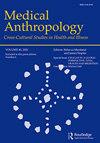用植物老师死藤水治疗:迷幻隐喻和多本体论。
IF 1.2
3区 社会学
Q2 ANTHROPOLOGY
引用次数: 0
摘要
巫师、新巫师、无神论者和其他一些人描述了他们从饮用死藤水中获得的特殊知识,支持了死藤水作为植物老师的跨文化观点。世俗爱好者对此作隐喻性解释,而万物有灵论者和其他人则从字面上理解。本文探讨了在秘鲁亚马逊河流域的一次疗养疗养活动中,希皮博巫师和他们的国际客户之间的本体论碰撞。文章探讨了身体体验(如净化和幻觉)如何为治疗和疾病的字面和隐喻观点提供信息。通过探讨不可通约的本体论,文章强调了多本体论框架如何处理本体论碰撞,而不一定要优先考虑特定的认知方式。本文章由计算机程序翻译,如有差异,请以英文原文为准。
Healing with Ayahuasca the Plant Teacher: Psychedelic Metaphoricity and Polyontologies.
Shamans, neo-shamans, atheists, and others describe gaining special knowledge from drinking ayahuasca, supporting the cross-cultural idea of ayahuasca as a plant teacher. While secular enthusiasts interpret this metaphorically, animists and others take it literally. This article examines ontological collisions at a healing retreat in the Peruvian Amazon, considering Shipibo shamans and their international clients. It explores how embodied experiences, such as purging and visions, inform both literal and metaphorical views of healing and illness. By addressing incommensurable ontologies, the article highlights how a polyontological framework approaches ontological collision without necessarily privileging specific ways of knowing.
求助全文
通过发布文献求助,成功后即可免费获取论文全文。
去求助
来源期刊

Medical Anthropology
Multiple-
CiteScore
4.10
自引率
4.30%
发文量
57
期刊介绍:
Medical Anthropology provides a global forum for scholarly articles on the social patterns of ill-health and disease transmission, and experiences of and knowledge about health, illness and wellbeing. These include the nature, organization and movement of peoples, technologies and treatments, and how inequalities pattern access to these. Articles published in the journal showcase the theoretical sophistication, methodological soundness and ethnographic richness of contemporary medical anthropology. Through the publication of empirical articles and editorials, we encourage our authors and readers to engage critically with the key debates of our time. Medical Anthropology invites manuscripts on a wide range of topics, reflecting the diversity and the expanding interests and concerns of researchers in the field.
 求助内容:
求助内容: 应助结果提醒方式:
应助结果提醒方式:


